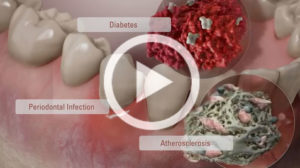For some time now, we have been explaining that periodontitis has a direct link with cardiovascular diseases.
And now this theory has acquired the status as “official”. According to the observation of the latest guidelines published by the European Society of Cardiology (SEC), periodontitis is a cardiovascular risk factor to be associated with endothelial dysfunction, atherosclerosis and an increased risk of heart attack and stroke. Therefore, gum disease joins other ailments and disorders affecting the cardiovascular area such as chronic kidney disease, sleep apnoea, erectile dysfunction or autoimmune diseases.
That is why prevention and treatment are recommended when considering the presence of periodontitis as a risk factor for developing cardiovascular disease. This recommendation of the SEC is a definitive jump when it comes to deal and preventing both gum disease and the health of our mouth in general in order to avoid dire coronary consequences.
After numerous scientific and clinical evidence of this relationship, there is finally an international consensus on its real impact. The guidelines published by the SEP state clearly that “periodontitis is placed in a section with other well-known disorders with a negative impact on the cardiovascular field.” A statement reassuring a clear need to continue controlling and protecting the health of our gums.













